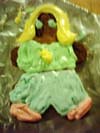(Ed. note: #36)
You know, I’m not going to be ashamed to say that I spent quite a bit of time on the internet. The internet is interesting. There’s a whole world of knowledge and videos and interaction that could not have existed before the advent on the web. Miss a TV show? No worries, it’s on the internet! Need to do some heavy-duty research for a paper? Holy crap, here’s JSTOR! Need to look some up some quick information to settle a bet? Bam, Wikipedia! It’s a glorious thing and I’m thankful that I spent my childhood without it so that I could properly appreciate it now.
But, as every sun casts a shadow, so does the internet. Guys, the internet is weird. Thanks to the most casual of web surfing, I know what degloving is. I’ve been goatse’d more times than I can count. I’ve seen a lady break wind into a cake. I’ve been disturbed and sickened by these series of tubes, and yet, I can’t stay away. It’s an illness.
Still, I know that there are many sunshiney people out there, unjaded by repeated surprise viewings of the inner workings of a man’s colon, who are going to cheerfully jump on the internet and be summarily crushed. That’s where Zack Parsons’s Your Next Door Neighbor is a Dragon comes in. Parsons ventures where none of us truly wish to go, seeking out those who allow their freak flags to fly in the anonymity of the web. He interviews furries, voraphiles, fanfiction writers, Ron Paul fans, and so many more, creating a short encyclopedia of common internet denizens. His interviews are held together with what I hope is a fictional road trip narrative, replete with cult kidnappings and obnoxious literary agents.
Parsons isn’t a journalist, nor does he claim to be. A brief exploration of his normal writing gig, Something Awful, shows a site that usually displays a decidedly negative view of the people interviewed in this book. Parsons, however, does cast a sympathetic eye on many of his subjects, who are even more absurd in the bright light of day than they are as ones and zeros in a world-wide community. It reminded me of Jon Ronson’s Them (which I’ve plugged more than once) in that it showed the real person behind the mask.
This isn’t a book that you use to write a research paper on the sociology of the internet, but it gives the reader a good idea of what lurks beneath the web’s glossy surface. Parsons subjects himself to it so you don’t have to. Be grateful.
Subscribe to:
Post Comments (Atom)








No comments:
Post a Comment